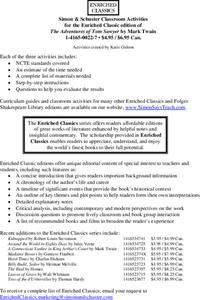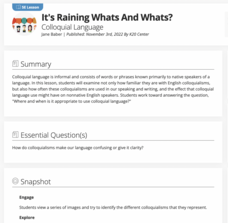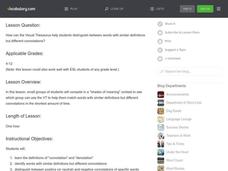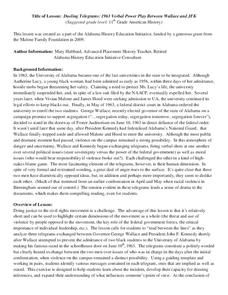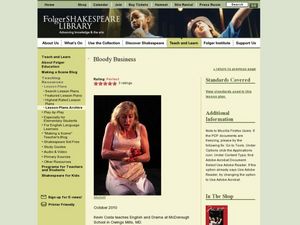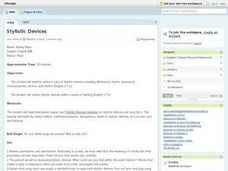Newseum
Weed Out Propaganda
Young scholars study four essential propaganda techniques: Simplification, Exploitation, Exaggeration, and Division (S.E.E.D.). Individuals select an example of propaganda from the past and present then compare how the key elements have...
Newseum
Disinformation Nation: Is It Propaganda?
Propaganda or not? That is the question researchers must answer as they analyze techniques used in ads. Pupils use a three-part definition to determine if the ad is propaganda or advertising.
Newseum
Disinformation Nation: Checking Your Emotions
Propaganda is designed to manipulate! High schoolers learn how to recognize the devices propagandists use to evoke strong emotional reactions and practice techniques that help them avoid being manipulated.
Simon & Schuster
Classroom Activities for The Adventures of Tom Sawyer by Mark Twain
A 16-page packet includes three activities for a unit study of Mark Twain's The Adventures of Tom Sawyer. Before beginning the novel, class members identify the factors in their lives that helped create their frame of reference,...
Newseum
Disinformation Nation: Separating Politics and Propaganda
Separating political rhetoric from propaganda is no small feat. Class members are challenged to examine two different sources about a candidate in an upcoming election and determine whether the primary purpose of the source is to inform...
National Endowment for the Humanities
Dostoevsky's Crime and Punishment
Pain and suffering do not have to be inevitable in a study of Crime and Punishment. A carefully scaffolded lesson introduces readers to the divided natures of the characters in Fyodor Dostoevsky's complex novel. Groups use the provided...
K20 LEARN
It’s Raining Whats and Whats? Colloquial Language
"Yuns betta outten the lights!" Colloquial language is the focus of a lesson that asks middle schoolers to consider the pros and cons of using idioms. They read articles, match expressions with their meaning and place of origin, and...
K20 LEARN
Is Pizza Epic? Word Choice
Remember when everything was Fantastic! Fabulous! Awesome! Iconic! A series of activities encourages young writers to move beyond these overused descriptors and instead choose a more precise language.
Anti-Defamation League
Intent vs. Impact: Why Does it Matter?
Contrary to the popular saying, words can hurt. Words matter! Tweens and teens can reflect on how words impact others even if the intent wasn't how the words were perceived. After examining an Instagram post where Lizzo apologized for...
Texas Education Agency (TEA)
Reference Guides (English III Reading)
An interactive resource introduces users to dictionaries, glossaries, and thesauri and the significant differences among these reference guides. Users learn which reference is best for which kind of search, examine sample entries from...
Texas Education Agency (TEA)
Drawing Conclusions Based on the Sufficiency and Strength of Research (English III Reading)
High school juniors learn how to construct a strong argument by crafting a claim and using neutral language backed by evidence from reliable sources. To do so, they learn to evaluate sources and evidence to support claims. They then...
Curated OER
Shades of Meaning
Students use words with similar meanings to analyze implied meanings. In this word connotation lesson, the teacher introduces the activity by asking students whether a new product should be advertised as "newfangled" or "cutting-edge." ...
Alabama Department of Archives and History
Dueling Telegrams: 1963 Verbal Power Play Between Wallace and JFK
Information, inferences, and innuendos. Text and subtext. Class members examine telegrams exchanged between President John F. Kennedy and Alabama Governor George Wallace, studying both what is stated and what is implied by the diction...
Memorial Hall Museum
Problems and Events Leading Up To the Attack of 1704
Groups read primary and secondary sources detailing the ambush at Bloody Brook on September 18, 1675 and the attack on The Falls in May of 1676. After examining the results of each attack, groups reflect on the language used in the...
Curated OER
Bloody Business
Students research word frequencies in Macbeth and create a frozen picture inspired by a word. For this Macbeth lesson, students view Blood Will Have Blood and discuss the dual meaning of the word "blood." Students identify five major...
Curated OER
Stylistic Devices
Students review connotation and denotation and stylistic devices in poetry. They read the lyrics to a song as it is being played and then discuss the meaning of the song. As a class, students read poems, share their thoughts, and...
Curated OER
1704 Attack on Deerfield
Class groups examine conflicting primary and secondary sources describing the 1704 attack on the fort at Deerfield by French and Native Americans and analyze the implications of discrepancies.
Scholastic
Choose Your Words Wisely (Grades 9-12)
Words, words, words. The function of words in persuasive writing is the focus of a group activity that asks members to analyze how words advertisers use are designed to influence targeted audiences.
Student Handouts
The Eight Parts of Speech
Presented as eight slices of a whole pie, here is a nice graphic organizer for your young grammarians to complete and keep handy as they learn about the eight parts of speech: interjections, nouns, conjunctions, pronouns, adjectives,...
NASA
Lunar Plant Growth Chamber
Would astronauts be able to grow their food on the Moon? Teams research plant growth in order to design and build a growth chamber that will function on the lunar surface. They narrow down plant choices based upon their strengths and...
Macmillan Education
Communication
Especially tricky for language is understanding the line between inappropriate, confrontational, (in)effective, (un)reasonable and diplomatic English. The activities in the resource permit class members to practice communicating using...
EngageNY
End-of-Module Assessment Task — Precalculus (Module 1)
A transformational assessment determines how far pupils are advancing toward mastering complex and matrix standards. The assessment checks the learners' understanding of linear transformations, complex numbers and the complex plane,...
Balanced Assessment
Getting Closer
Flip the script! Reverse the situation and ask the class to find the function given asymptotes. The task requires class members to use their knowledge of functions and asymptotes to create functions that have a given asymptote or...
EngageNY
End-of-Module Assessment Task: Pre-Calculus Module 4
Challenge your scholars to show what they know about the Law of Sines, Law of Cosines, and inverses. The six-question assessment is the last in a series of 16. Pupils find the area of triangles and show that the Law of Sines and Law of...
Other popular searches
- Connotation and Denotation
- Connotation Denotation
- Connotation vs. Denotation
- Connotation vs Denotation
- Connotations and Denotations
- Connotation, Denotation
- Conotation and Denotation
- Denotation and Connotations
- Connatation Denotation
- Connotation Denotation Ppt
- 113 Connotation Denotation
- Co Notation and Denotation





